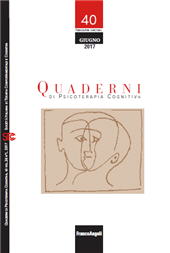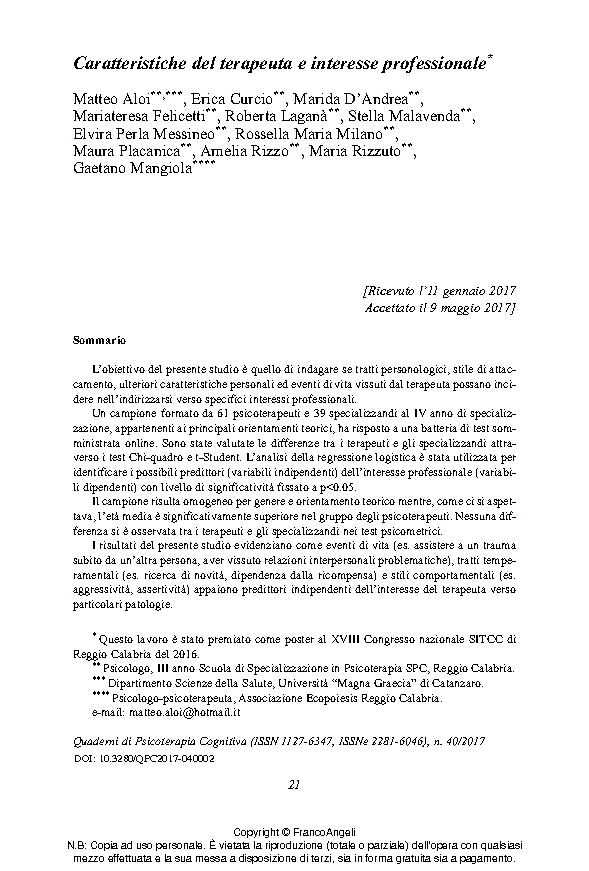Caratteristiche del terapeuta e interesse professionale
21-37 p.
L'obiettivo del presente studio è quello di indagare se tratti personologici, stile di attaccamento, ulteriori caratteristiche personali ed eventi di vita vissuti dal terapeuta possano incidere nell'indirizzarsi verso specifici interessi professionali. Un campione formato da 61 psicoterapeuti e 39 specializzandi al IV anno di specializzazione, appartenenti ai principali orientamenti teorici, ha risposto a una batteria di test somministrata online. Sono state valutate le differenze tra i terapeuti e gli specializzandi attraverso i test Chi-quadro e t-Student. L'analisi della regressione logistica è stata utilizzata per identificare i possibili predittori (variabili indipendenti) dell'interesse professionale (variabili dipendenti) con livello di significatività fissato a p<0.05.
Il campione risulta omogeneo per genere e orientamento teorico mentre, come ci si aspettava, l'età media è significativamente superiore nel gruppo degli psicoterapeuti. Nessuna differenza si è osservata tra i terapeuti e gli specializzandi nei test psicometrici. I risultati del presente studio evidenziano come eventi di vita (es. assistere a un trauma subito da un'altra persona, aver vissuto relazioni interpersonali problematiche), tratti temperamentali (es. ricerca di novità, dipendenza dalla ricompensa) e stili comportamentali (es. aggressività, assertività) appaiono predittori indipendenti dell'interesse del terapeuta verso particolari patologie. [Testo dell'editore].
The aim of this study is to investigate whether personality traits, attachment style, other variables concerning personal characteristics and life events experienced by the therapist can influence his/her own professional interest. A sample of 61 psychotherapists and 39 students at the fourth year of specialization in psychotherapy, belonging to the main theoretical approaches, answered to an online test battery. The differences between the therapists and residents were evaluated through Chi-square and t-Student. The logistic regression analysis was used to identify possible predictor (independent variables) of professional interests (dependent variables) with significance level set at p<0.05.
The sample was homogenous in gender and theoretical orientation while, as expected, the average age was significantly higher in the group of psychotherapists. No differences were observed between the therapists and residents in psychometric tests. Our results showed that life events (eg. experienced a trauma suffered by another person, a punitive educational style received, interpersonal problems), temperamental traits (eg. novelty seeking, reward dependence) and behavioral styles (eg. aggressiveness, assertiveness) were independent predictors of interest therapist to particular diseases. [Publisher's Text].
Ist Teil von
Quaderni di Psicoterapia Cognitiva : 40, 1, 2017-
Artikel aus derselben Ausgabe (einzeln erhältlich)
-
Informationen
ISSN: 2281-6046
KEYWORDS
- Caratteristiche del terapeuta, esperienze del terapeuta, personalità, orientamento teorico
- Therapist characteristics, therapist experiences, personality, theoretical orientation



